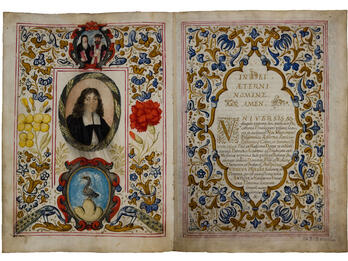Ḥovot Yehudah (The Duties of Judah)
Judah ben Eleazar
1686
On Whether Israelites Can Apostasize
It was explained earlier in part 2 that faith is [like a] possession that is, it is a possession that belongs to man’s soul, the way knowledge belongs to the soul of a learned man. Yet we see that these possessions, notwithstanding that they are impressed upon the soul, often become corrupt and enfeebled when a…
Related Guide
Early Modern Trade and Mercantilism
International trade drove Jewish mobility during the age of mercantilism, as Jewish merchants formed wide commercial networks and partnerships and developed cosmopolitan attitudes that facilitated civic inclusion.
Related Guide
Education and Scholarship
The early modern period featured educational reforms, anti-Christian polemics, and growing Jewish university participation.
Creator Bio
Judah ben Eleazar
Judah ben Eleazer lived in Kashan, Iran, at a tumultuous time; in his lifetime the Jews of Iran were subject to persecutions and forced conversions (particularly from 1656 to 1662), and the Jewish community was also shaken by the Sabbatean movement. Judah composed a medical treatise that draws heavily on Arabic and Persian medical texts (completed 1660/61), an astrological work, a poetic version of the legend of the seven viziers, and a text discussing the dangers of drinking wine. However, he is best known for his ḥovot Yehudah (The Duties of Judah, completed 1686). A follower of the rationalist philosophical tradition, Judah used the local vernacular to outline the major principles of the Jewish faith for audiences unable to read Hebrew, and in so doing, to strengthen their faith. The work demonstrates Judah’s wide knowledge of Greek and medieval Islamic philosophy, Persian literature, the New Testament, Quran, and Apocrypha as well as Jewish texts, from the Bible to kabbalistic texts and Jewish philosophy.
You may also like



